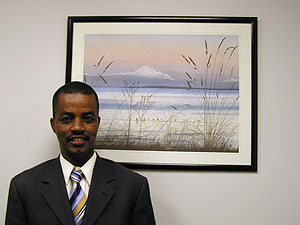This Month (October) in Oromo History: On a cold October day in 1986, long-time Maa'ikalaawii (Central Prison) Oromo prisoners of conscience: Gezahegne Kassahun, Kebede Demissie, Muhee Abdo and Yigezu Wake, were dragged out of their cells and executed by cold-blooded security officers of the Derg regime inside a military intelligence compound in Kotebe, a Finfinne suburb.
According to an Amnesty International Report, in addition to being ardent Oromo nationalists, the four executed prisoners were:
Gezahegne Kassahun - former first deputy chairman, All Ethiopia Trades Union
Kebede Demissie - former Ministry of Agriculture official
Muhee Abdo - civil servant and university graduate
Yigezu Wake - former army lieutenant
And, their "crime" resulting in this cold-blooded extrajudicial execution was being Oromo.
Their fellow prisoner of conscience, Ibsaa Guutama, recounts that October day in 1986 in his book, titled Prison of Conscience, as follows:
"From the Upper Compound, Muhee Abdoo and Gazaheny Kaasaahun were called [out]. It was already heard that several old prisoners from the Karchallee had arrived presumably to be released. Gazaheny informed this writer [Ibsaa] about their arrival, shortly before he himself was called out. The subsequent addition of the two comrades [Muhee and Gazaheny] raised doubt. After some time, the Administration sent for their belongings. That was an enough clue for something bad [had happened to Muhee and Gazaheny.] All their comrades were numbed. They did not know how to respond." (Source: Guutama, Ibsaa, "Prison of Conscience: Upper Compound Maa'kalaawii," Gubirmans Publishing, New York, 2003.)

Ropes used to strangle & execute the October 1986 Oromo martyrs: Gezahegne Kassahun, Kebede Demissie, Muhee Abdo & Yigezu Wake. Source: Argentine Forensic Anthropology Team (Viewer Discretion Advised) |
In a similar account, the Argentine Forensic Anthropology Team, that worked with the Special Prosecutors Office (which was set up in 1992 to investigate and prosecute former Derg officials), reports the following:
"The former Makalawi prisoners that we interviewed said that late on the night of October 7, 1979 [Geez Calendar, 1986 in European Calendar], a truck arrived in the prison compound and twenty prisoners were offloaded. The night was cold and many of the new prisoners had wrapped themselves in blankets. They were put in holding cells apart from the main cellblock. The next morning, at 10-20 minutes intervals, the guards called out each of the twenty new prisoners by name and, one by one, they were marched away. Ten Makalawi prisoners were similarly called out and taken away. The thirty men never returned, and by late afternoon rumors began to circulate that they had all been executed." (Source: Reports by the Argentine Forensic Anthropology Team)
Extrajudicial imprisonments and cold-blooded executions against Oromo nationalists were not limited to the four October 1986 martyrs and to the Derg regime. Just a few days ago, the Oromo Support Group reported 3,981 extrajudicial killings and 943 disappearances. In addition, it has been reported by former inmates that the Qallitti Prison Camp alone had 85% Oromo prisoners of conscience. This is despicable and outrageous by all human rights standards.
Tortures, illegal imprisonments and killings of Oromo nationalists are the tools deployed by the Abyssinian System of Domination to intimidate and exterminate the Oromummaa movement. It is, therefore, imperative that all independent Oromo nationalist institutions declare October as the Oromo Nationalist Prisoner of Conscience Month to honor the October 1986 martyrs, to bring about awareness about the hundreds and thousands of Oromo prisoners of conscience languishing helplessly and awaiting extrajudicial executions in prison camps of the Empire today, and to invigorate the campaign for the unconditional release of all Oromo prisoners of conscience!
Help spread this noble cause of dedicating October to be the Oromo Nationalist Prisoner of Conscience Month: EMAIL HERE.


